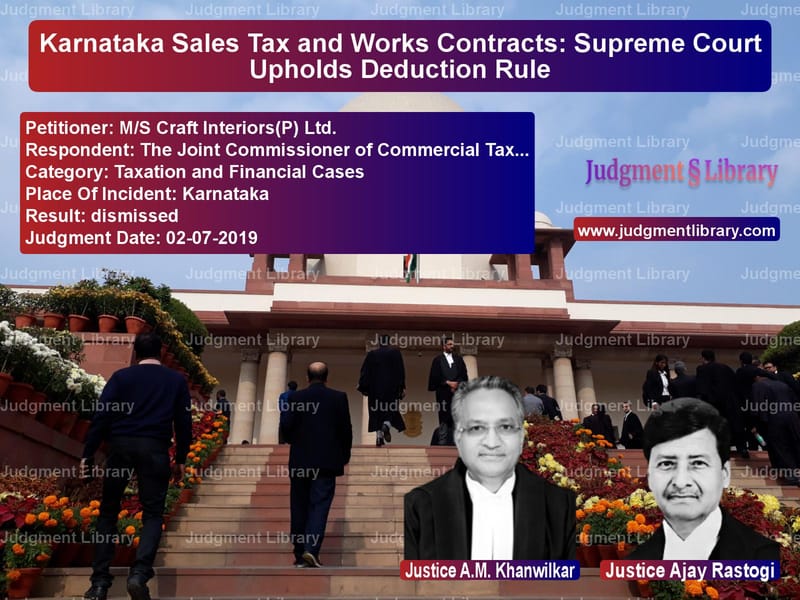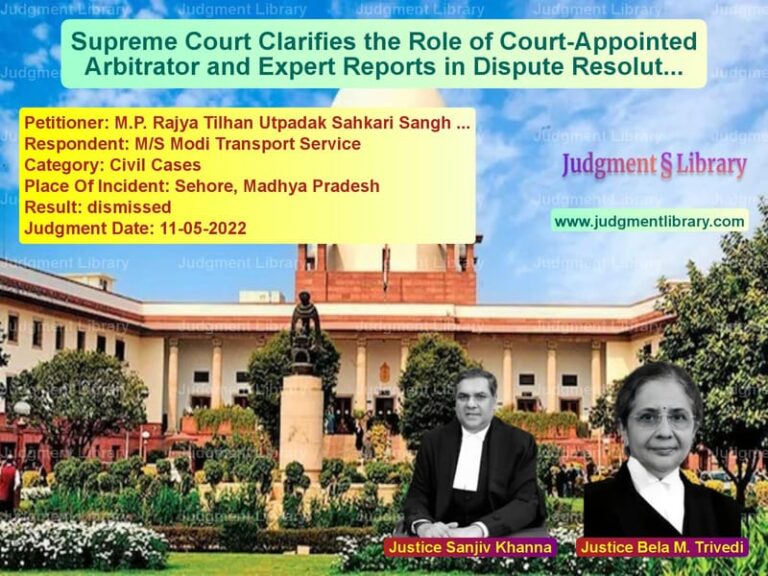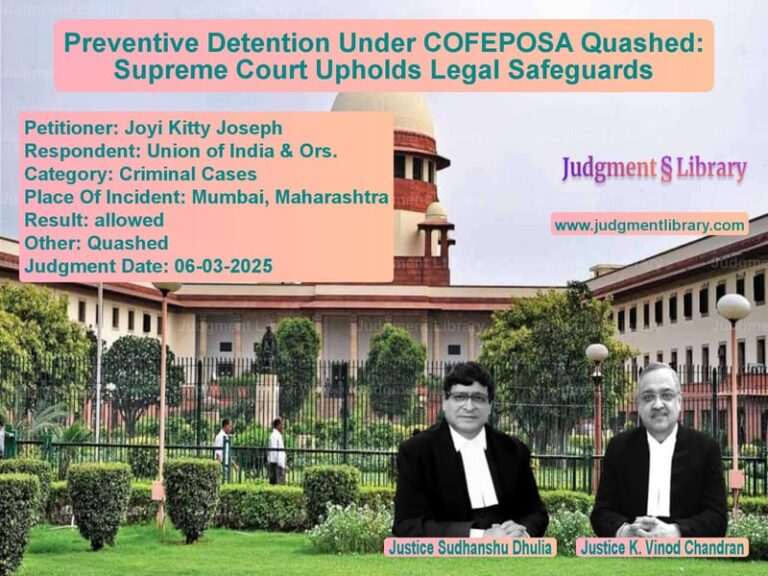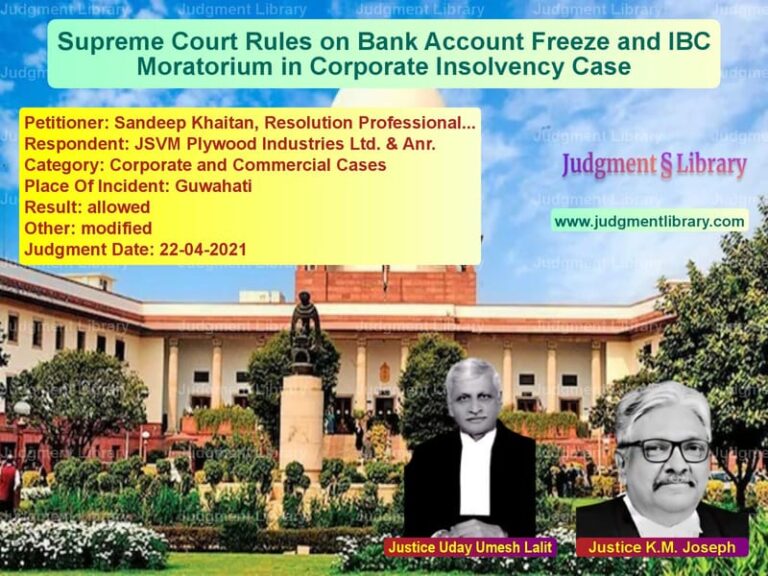Karnataka Sales Tax and Works Contracts: Supreme Court Upholds Deduction Rule
The case of M/S Craft Interiors(P) Ltd. vs. The Joint Commissioner of Commercial Taxes (Intelligence) & Anr. revolves around the legality of Rule 6(4)(m)(i) of the Karnataka Sales Tax (KST) Rules, 1957. The primary issue in the case was whether the condition of ‘use in the same form’ imposed under the rule unlawfully extended the scope of the charging provision under Section 5B of the Karnataka Sales Tax Act, 1957.
The appellant, Craft Interiors Pvt. Ltd., engaged in interior decoration and works contracts, purchased materials from registered dealers and sought a deduction from turnover as per Rule 6(4)(m)(i) of the KST Rules, which allows deductions for goods used in works contracts in the same form as purchased. However, tax authorities disallowed the deduction on the ground that the timber and other materials were processed before use.
Petitioner’s Arguments
The petitioner contended that:
- Rule 6(4)(m)(i) extended beyond the scope of Section 5B of the KST Act, which does not restrict the form in which goods are transferred in a works contract.
- The rule limited deduction eligibility by requiring goods to be used in the same form, whereas the charging section did not impose such a restriction.
- A similar provision in Andhra Pradesh (Section 5F of the A.P. General Sales Tax Act) was struck down in Media Communications vs. Government of Andhra Pradesh (1997), and the Supreme Court had dismissed the appeal against it.
- Provisional assessments under Section 28 could not be initiated as final assessments had already been completed for the years 1998-1999 and 1999-2000.
Respondent’s Arguments
The State of Karnataka argued that:
- Section 5B and Rule 6(4)(m)(i) operated in different spheres – Section 5B imposed tax, while Rule 6(4)(m)(i) allowed deductions for goods used in the same form.
- Deduction was only available for goods that had already suffered tax and were transferred in the same form. If the goods were processed or used to manufacture another commodity, they could be taxed again.
- Explanation III to Rule 6(4) clarified that goods undergoing transformation into a different commodity before use in works contracts could not qualify for deductions.
- The case of Media Communications was not applicable, as the Andhra Pradesh case involved different legal principles.
Supreme Court’s Judgment
The bench, comprising A.M. Khanwilkar and Ajay Rastogi, upheld the validity of Rule 6(4)(m)(i) and dismissed the appeal.
Key observations by the Court:
- Section 5B is a charging provision imposing tax on transfer of property in goods under a works contract, while Rule 6(4)(m)(i) provides a deduction mechanism.
- The rule ensures that goods already taxed are not taxed again unless they undergo a transformation into a different commodity.
- Past Supreme Court rulings, including State of Tamil Nadu vs. Pyare Lal Malhotra (1976) and Vasantham Foundry vs. Union of India (1995), established that if a new commercial commodity emerges from taxed goods, it can be taxed again.
- The judgment in Media Communications did not affect this case, as the mere dismissal of a Special Leave Petition (SLP) does not imply approval of the High Court’s reasoning.
Critical Judgment Excerpt: “Section 5B of the KST Act and Rule 6(4)(m)(i) operate in different spheres. Section 5B is a charging provision for levy of sales tax, whereas Rule 6(4)(m)(i) is a provision for deduction from tax. Under Section 5B, tax can be levied on transfer of property in the goods whether as goods or in some other form, whereas Rule 6(4)(m)(i) provides for a deduction in respect of the goods which have already suffered tax and which are used in the same form.”
Final Decision
The Supreme Court dismissed the appeal, allowing tax authorities to proceed with assessments independently. The petitioner was granted an opportunity to present its case before the assessing authority.
Implications of the Judgment
This ruling has significant implications for businesses engaged in works contracts:
- Goods purchased and used in works contracts must retain their original form to qualify for deductions under Rule 6(4)(m)(i).
- If goods undergo transformation into a different commercial commodity, they can be taxed again.
- The Karnataka Sales Tax Rules maintain consistency with sales tax principles established by the Supreme Court.
The decision clarifies the taxation framework for works contracts in Karnataka and affirms the legislative competence of tax authorities in enforcing compliance. Businesses must carefully assess their claims for deductions to ensure adherence to statutory requirements.
Petitioner Name: M/S Craft Interiors(P) Ltd..Respondent Name: The Joint Commissioner of Commercial Taxes (Intelligence) & Anr..Judgment By: Justice A.M. Khanwilkar, Justice Ajay Rastogi.Place Of Incident: Karnataka.Judgment Date: 02-07-2019.
Don’t miss out on the full details! Download the complete judgment in PDF format below and gain valuable insights instantly!
Download Judgment: MS Craft Interiors( vs The Joint Commission Supreme Court of India Judgment Dated 02-07-2019.pdf
Direct Downlaod Judgment: Direct downlaod this Judgment
See all petitions in Income Tax Disputes
See all petitions in Judgment by A M Khanwilkar
See all petitions in Judgment by Ajay Rastogi
See all petitions in dismissed
See all petitions in supreme court of India judgments July 2019
See all petitions in 2019 judgments
See all posts in Taxation and Financial Cases Category
See all allowed petitions in Taxation and Financial Cases Category
See all Dismissed petitions in Taxation and Financial Cases Category
See all partially allowed petitions in Taxation and Financial Cases Category







